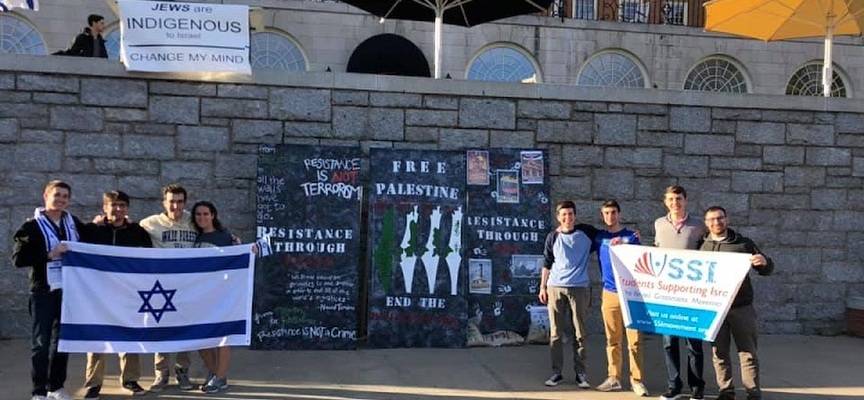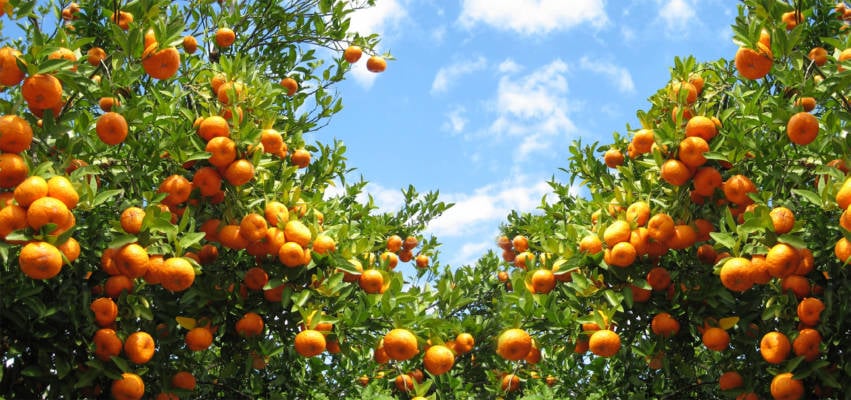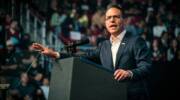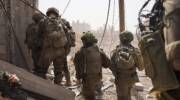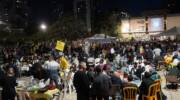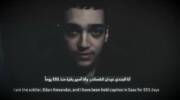‘Palestine Solidarity Week’ at Wake Forest University draws concern from Zionist, Jewish students.
By Shiri Moshe, The Algemeiner
Students at Wake Forest University in North Carolina are hosting a week-long campaign to support the Palestinian cause, sharing materials and organizing events that have drawn push-back from some Zionist and Jewish students.
The “Solidarity with Palestine” week — promoted by groups including the school’s chapter of the Young Democratic Socialists of America (YDSA), but not explicitly claimed by any — includes the display of a mock wall on campus, which mimics the security barrier the Israeli government began constructing in Judea and Samaria during the Second Intifada in response to repeated suicide bombings and other Palestinian terrorist attacks.
All Modern-Day Israel Labeled ‘Palestine’
The mock wall includes a four-panel map that labels all of modern-day Israel, the West Bank and Gaza Strip as “Palestine,” above the caption, “end the occupation.” Other quotes include the phrase, “resistance is not terrorism.” The word “resistance” has in the past been used by Palestinian groups — including US-designed terrorist organizations like Hamas and Palestinian Islamic Jihad — to refer to both unarmed campaigns and violent attacks against civilians.
Members of the Zionist group WFU Students Supporting Israel (SSI) have expressed opposition to the display, posing before it with an Israeli flag and a banner reading, “Jewish are indigenous to Israel, change my mind.”
“Many students might feel frustrated with messages that openly support terror on campus like ‘resistance isn’t terrorism,’” WFU SSI president Phillip Yurchenko told The Algemeiner. “We are all aware of the results that the Second Intifada and rockets from Gaza brought on Israel.”
Concerns have also been raised over another exhibit — titled, “How Palestine became Israel” and located at the Benson University Center — which variously accuses Israel of “apartheid,” “murder of children,” and denying Palestinians “the right to life and liberty.”
Denying Anti-Semitism
One panel in the set specifically rejects conflating anti-Zionism with anti-Semitism, pointing to the Anti-Semitism Awareness Act of 2016 and claiming that “an example of anti-Semitism in the bill was criticism of the State of Israel.” Yet the definition of anti-Semitism that the legislation promoted explicitly states that “criticism of Israel similar to that leveled against any other country cannot be regarded as anti-Semitic.”
That definition — similar to the one adopted by the International Holocaust Remembrance Alliance (IHRA) and recognized by its 31 member states, as well as leading Jewish communal representatives in the United States and globally — also recognizes that “denying the Jewish people their right to self-determination, and denying Israel the right to exist” are anti-Semitic.
The text on the display panel further dismissed the definition for its inclusion of this language, claiming it was overly broad and failed to represent a plurality of views.
None of the posters “have any club names or sponsorships,” Yurchenko observed, meaning that passersby “are not sure who is sponsoring the events.”
One student who objected to the messages, who Yurchenko said “is not part of the SSI team,” had opted to respond by dismantling one of the displays. A source familiar with the incident, who requested to speak on condition of anonymity, said the student was reportedly “very emotionally distraught” and “highly offended” by what they saw in some of the panels.
The displays have not been the only source of tension. Objections have also been shared over a panel titled “Free Speech, Free Palestine,” scheduled for Wednesday evening, which will touch on, in part, “the differences between anti-zionism and anti-Semitism.”
‘Especially Important to Have a Zionist Voice’
Yurchenko said that members of the Jewish community have expressed reservations over representation at the discussion, pointing to an email exchange last week in which another SSI member and a former president of WFU Hillel shared a statement from both groups with the panel’s organizers.
Pointing to the national rise in anti-Semitic incidents, the SSI-Hillel statement noted that “it is especially important to have a Zionist voice that represents Wake student’s Jewish Community since this is something that impacts us daily,” and included two suggestions.
Organizers responded by saying that while they considered the request, they “unfortunately concluded that the panel is already full.”
“In particular, given that we already have a Jewish panelist with an extensive background in Jewish Studies, I hope that your concerns about representation are satisfied,” they added.
A source familiar with the events said this was likely a reference to Barry Trachtenberg, the director of WFU’s Jewish Studies Program, though a full list of panelists has not been announced.
Trachtenberg has in the past repeatedly backed initiatives affiliated with the Palestinian-led boycott, divestment, and sanctions (BDS) campaign against Israel and is listed as an endorser of the US Campaign for the Academic and Cultural Boycott of Israel.
On Wednesday afternoon, YDSA announced that the evening’s panel would be moved to a larger hall to accommodate increased interested. Yurchenko said he and fellow SSI members plan on attending the discussion and showing solidarity with the Jewish community.
YDSA did not immediately respond to a request for comment.
MAKE THE LAND OF ISRAEL EVEN MORE BEAUTIFUL!
PLANT YOUR VERY OWN FRUIT TREES IN ISRAEL!
Farmers near the Gaza border lost family, friends and workers. Spring is here, and they desperately need help to replant the farms. Join us in blessing the People and Land of Israel.
“I will ordain My blessing for you…” (Leviticus 25:4)
